Post-Match Interviews: Insights, Tips, and Effective Strategies
Updated On: October 23, 2025 by Aaron Connolly
Understanding Post-Match Interviews
Post-match interviews are quick, structured chats between journalists and players right after a match wraps up. They connect the action on the field to fans, letting people hear straight from the players about what just happened.
What Are Post-Match Interviews?
A post-match interview is a face-to-face conversation between a journalist and an athlete moments after the game ends. Usually, these happen within half an hour of the final whistle—sometimes even sooner.
The setup is simple. A journalist tosses out a handful of questions, maybe three to five, all about the match. The player shares their immediate thoughts and feelings, often still catching their breath.
Most interviews go something like this:
- An opener about overall performance
- A question drilling into a specific key moment
- Something about team strategy or tactics
- A wrap-up about future matches
Players often show up still sweaty and out of breath. The timing isn’t an accident—it catches those unfiltered, emotional reactions before players have a chance to rehearse or overthink what they’ll say.
These interviews usually last just a few minutes—two to five, tops. Sometimes, if things move to a private space, they’ll go a bit longer, maybe up to an hour, but that’s rare.
Common Settings and Sports
You’ll find post-match interviews in almost every pro sport. Football, rugby, cricket, tennis, basketball—you name it, they all use this format.
Television interviews usually happen right by the pitch or in the stadium tunnel. The player faces the camera, journalist at their side. These reach massive audiences on live TV.
Mixed zones are set up so several journalists can grab a word with players as they walk through. Athletes pick and choose who to talk to. This works best at big tournaments with lots of media.
Press conferences are a bit different. One player or coach answers questions from a whole room of journalists. These usually happen after the quick one-on-ones.
Digital platforms have jumped in, too. Social media teams do quick interviews for YouTube, Instagram, TikTok—usually more relaxed and unscripted than TV.
Purpose in the Sporting World
Post-match interviews do a few important things. They connect fans to players, give the media content, and tick off some contractual boxes.
Fan connection might be the biggest one. Supporters want to hear it straight from their heroes, whether it’s a huge win or a crushing loss. These interviews help build real emotional bonds between clubs and their communities.
James Connolly, a gaming expert, puts it well: “The immediacy of post-match interviews captures authentic reactions that planned content simply can’t match.”
Media requirements drive a lot of this, too. TV networks pay serious money for broadcast rights, and part of the deal is guaranteed access to players for interviews. Broadcasters need these moments to make the investment worth it.
Commercial obligations sneak in here as well. Players’ contracts usually say they have to do interviews after matches. Leagues can fine clubs if players keep dodging the media. It’s all about keeping a steady stream of content for sponsors and networks.
You probably won’t hear tactical secrets or wild opinions in these interviews. Still, they do give fans a peek into the mental and emotional side of competition that you just don’t get elsewhere.
Role in the Post-Match Process
Post-match interviews act as a crucial link between match results and how teams and individuals move forward. They let coaches and coordinators gather feedback while keeping relationships alive with both winners and those who didn’t make the cut.
Timing and Sequence
Most post-match interviews kick off within 48 to 72 hours after the results come out. That window gives people a bit of time to cool off, but not so much that the moment feels stale.
Interviewers usually start with those who matched successfully—keeping those relationships strong is key for programme success.
Unmatched participants get their turn during or after the main post-match period. These talks can be goldmines for feedback about how to improve next time.
Programme coordinators try to finish most interviews within two weeks of the results. That way, memories stay fresh and people have time to process how things went.
It’s important to move fast. Unmatched candidates often jump into other application processes, so their schedules fill up quickly.
Connection to Match Results
Match results shape what interviewers ask and how they approach things. For those who matched, the focus is on onboarding feedback and relationship building for whatever comes next.
Interviews with matched participants dig into what went right during selection. Questions usually center on how the interviews felt and what influenced their rankings.
For unmatched applicants, the conversation shifts. Interviewers look at strengths, areas to improve, and offer advice for future applications.
Even if someone didn’t match, the process can leave a good impression. They might reapply later or recommend the programme to someone else.
Feedback from these interviews helps programmes fine-tune their selection process. Paired with stats from match outcomes, this info is pretty valuable.
Participants in Post-Match Interviews
Three main groups come together for post-match interviews, and each brings something different. Players tend to be guarded, managers use interviews with strategy in mind, and interviewers have to juggle getting good content with keeping professional relationships intact.
Players and Athletes
Players usually keep their guard up during post-match interviews. Most have gone through media training to dodge saying anything that could hurt their careers.
Typical player responses:
- Goalscorers give credit to the team and downplay their own efforts
- Losing players admit mistakes and promise to do better
- Almost nobody calls out teammates or referees
As soon as the cameras start rolling, players flip into “media mode.” That’s why answers often sound polite but bland. Many players worry that showing too much emotion could backfire or spark a wave of social media criticism.
Some players are starting to see interviews as a chance to show their personality. That can help with sponsors or even future transfers. When players step outside the script, they come across as more real and relatable.
Interview obligations depend on the sport and league. Players usually have to do interviews after big matches, but sometimes they can skip the optional ones.
Coaches and Managers
Managers usually feel more at ease with post-match interviews than players. They know it’s their job to explain results and often use their time in front of the mic for strategic reasons.
Some common managerial tactics:
- Deflection: Blaming refs or outside factors after a loss
- Protection: Never throwing their own players under the bus
- Agenda-setting: Making statements that grab headlines
Winning managers often play down victories to keep their teams grounded. They know bold comments can fire up future opponents or set fans’ expectations too high.
Managers have gotten pretty skilled at using the media. They’ve learned from legends like Sir Alex Ferguson that a well-timed rant can take the spotlight off a bad performance and put it on something else.
The best managers use interviews to talk to fans, pressure rivals, or even send signals to club owners about transfers or resources.
Media and Interviewers
Interviewers have a tough job. They need to get meaningful answers in just a couple minutes while keeping relationships smooth for the next time around.
Biggest interviewer challenges:
- Getting real answers from media-savvy players and managers
- Building and maintaining trust for future interviews
- Avoiding questions that completely shut people down
- Working fast enough for live TV deadlines
Interviewers have changed up their prep over the years. Now, most prefer short, open-ended questions that get people talking instead of giving rehearsed lines.
Building trust is huge. Since interviewers see the same faces week after week, going too hard can make future interviews awkward or even impossible.
The best interviewers focus on getting insightful answers—not just tough questions for the sake of it. They know viewers want to learn something, not just watch a confrontation.
Key Topics and Questions
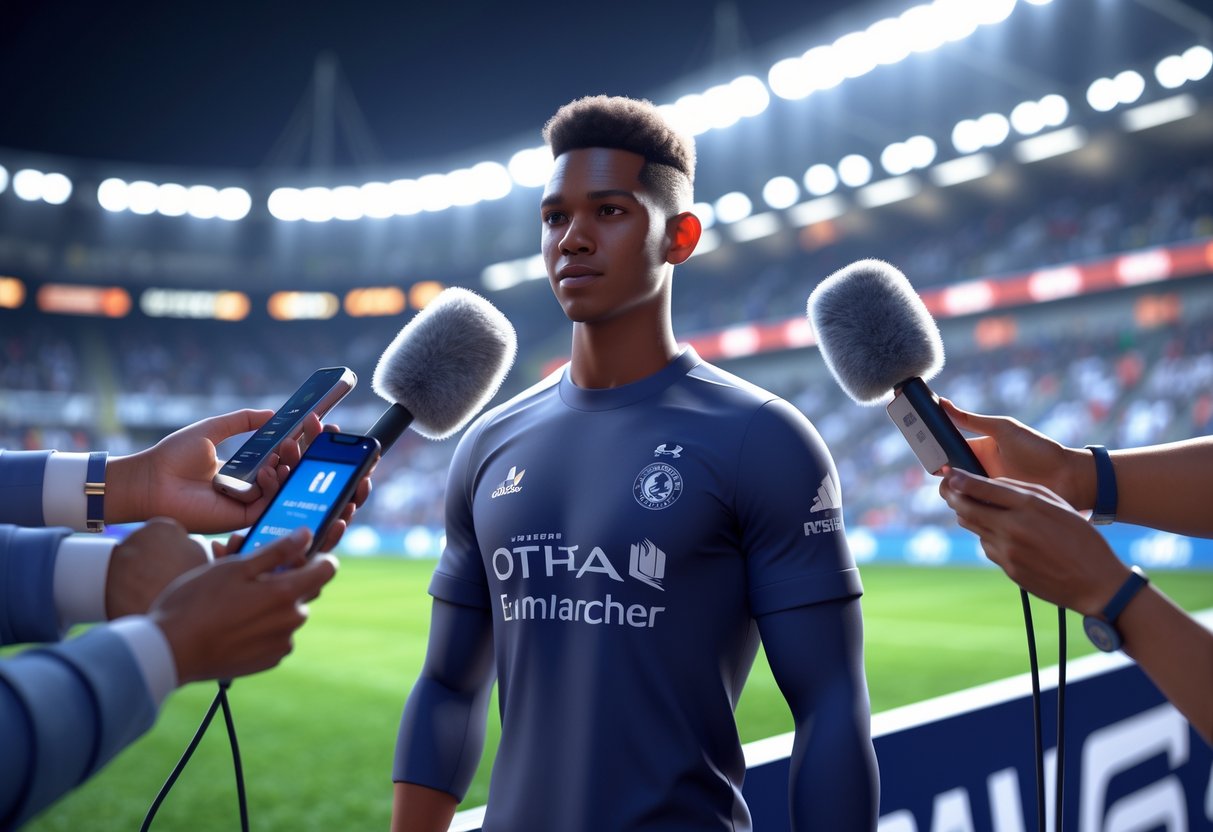
Post-match interviews usually stick to three areas fans care about most. They cover how teams and players performed, the tactics behind big moments, and the emotional reactions to wins or losses.
Performance Commentary
Performance questions are the bread and butter of post-match interviews. Interviewers ask players to break down what they did and how the team worked together.
Questions like “How did you feel out there?” or “What was working for your team today?” come up a lot. Players talk through big plays, maybe a clutch kill or a smart defensive move.
Key performance topics:
- Individual stats and highlights
- Teamwork and communication
- Performing under pressure
- Comparing this match to past ones
After a win, players usually keep it positive and focus on the team. If they lose, they take responsibility but avoid blaming anyone else.
Tactics and Game Decisions
Tactical questions dig into the thinking behind important moments. Coaches and team leaders explain choices about drafts, maps, or sudden changes in strategy.
Interviewers ask about why they picked certain champions, how they decided on map bans, or what led to a tactical timeout. These questions show fans the mental game behind the action.
Common tactical topics:
- Draft and champion selection
- Map picks and bans
- In-game shot calls
- Adjustments between rounds or maps
Teams don’t give away future plans in these interviews. They’ll talk about what just happened, but keep their cards close for next time. Coaches have to walk a fine line between being open and protecting their edge.
Reactions to Outcomes
Emotional responses make these interviews feel real. Winners get to celebrate, losers have to process disappointment in front of the world.
Victory interviews capture the joy and relief after a tough match. Players often thank fans and give props to their opponents. They’ll talk about what the win means for the next stage or the league table.
Losing hurts, and those interviews are trickier. Players usually show accountability but try to keep the team united. They’ll talk about what they learned and how they’ll improve.
Typical reaction themes:
- Immediate emotions
- Impact on tournament or season goals
- Messages to fans
- Motivation for upcoming matches
The best interviews strike a balance—celebrating without gloating, and always showing respect for the other side. That’s when fans get a glimpse of who these players really are.
Interview Techniques and Best Practices
Good post-match interviews rely on solid prep and clear, honest communication. If you want interviews fans will actually watch—and players won’t dread—these are the basics.
Preparation Before the Interview
Do your homework. You need to know the match details, key moments, and some background on the players. That means watching the whole game, checking recent team form, and knowing if there’s a storyline brewing.
Write flexible questions. Jot down eight or ten, but be ready to toss them if something wild happens. A massive upset will need different questions than a routine win.
Some things to look into:
- Recent team changes—any roster swaps or new coaches?
- Head-to-head records—how have these teams matched up before?
- Tournament context—is this an elimination game or just the opener?
- Individual player milestones or struggles
Pick your moment. Players need a few minutes—five or ten—to cool down after a high-stress match. If you rush in too soon, you’ll probably get flat answers.
Test your gear early. Make sure mics, cameras, and streams are working before the players show up. Technical hiccups just slow everything down and kill the vibe.
Effective Communication Skills
Ask open questions that invite stories. Instead of asking, “Did you play well?”, try, “Walk us through that final team fight decision.” You’ll get richer responses and, honestly, way more interesting content.
Listen actively and follow up. When a player brings up something unexpected, dive in. Some of the best insights just pop up when you go off-script.
Keep energy appropriate to the situation. High-energy celebrations call for a different vibe than tough losses. Match the player’s mood, but keep it professional.
Use simple, clear language. Skip the jargon that casual viewers might not get. If a technical term comes up, explain it naturally, don’t overthink it.
Give players time to think. Don’t rush to fill every silence. Sometimes, the best quotes come after a pause—let players gather their thoughts.
Impact on Applicants and Athletes
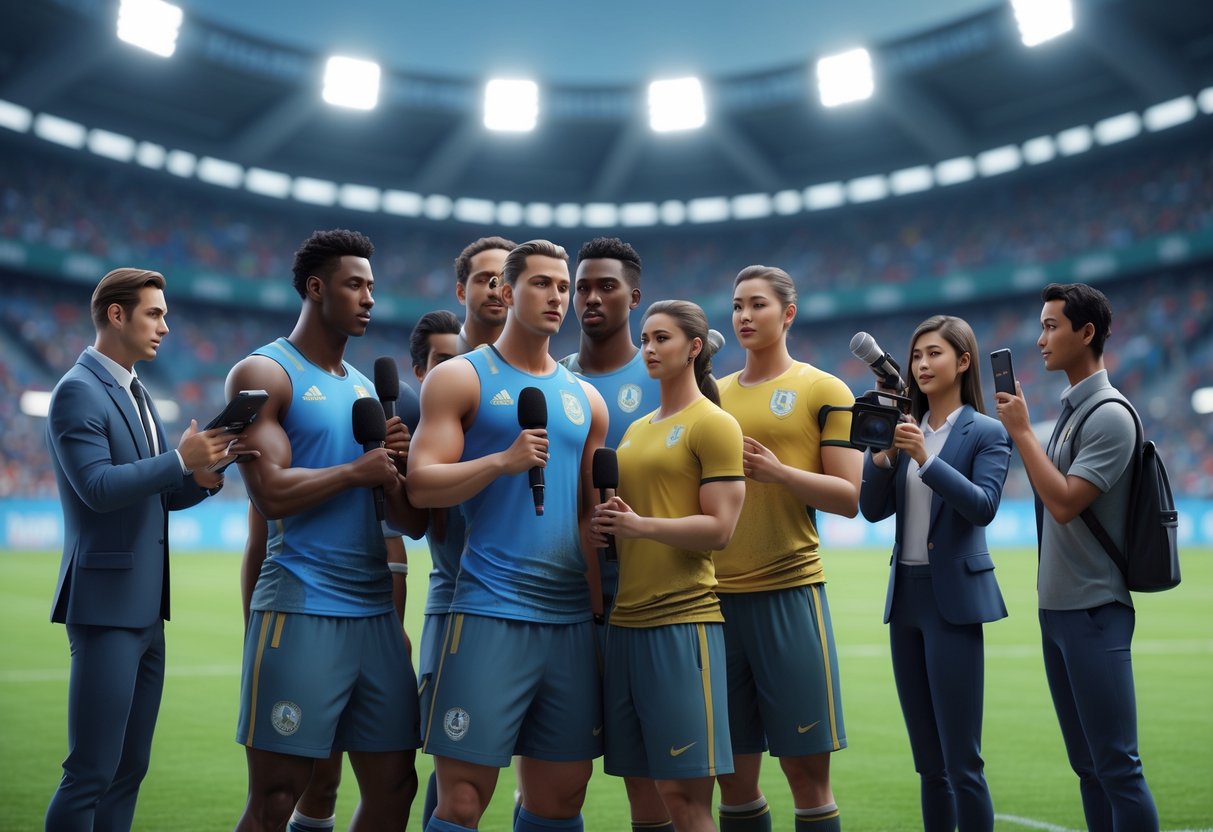
Post-match interviews crank up the pressure on athletes at some of the biggest moments in their careers. The way players handle these high-stakes conversations shapes how the public sees them and can impact their future in competitive gaming.
Emotional Reactions and Handling Pressure
Athletes walk into interviews with emotions running wild—right after a major win or a crushing loss. Their self-control usually runs low after hours of intense gameplay.
Many esports players struggle with this timing. They’ve just poured everything into the match, and suddenly, they need to speak clearly on camera while still processing everything.
Common emotional reactions include:
- Tears after a tough loss
- Nervous jokes that miss the mark
- Walking out mid-interview
- Over-the-top celebrations
- Publicly blaming teammates
Young applicants in pro esports often don’t have media training. They know how to play, but cameras and hard questions? Not so much.
Some players skip interviews altogether to protect their mental health. But with contracts now requiring media appearances, that option’s disappearing for many.
Career Implications
Interview performance can make or break sponsorship deals and team contracts. Sponsors want athletes who represent their brands well.
One bad interview can tank an applicant’s reputation. Clips spread fast on social media. Gaming organizations definitely check out media presence when signing new talent.
Career benefits of strong interviews:
- More sponsorship opportunities
- Growing fan base
- Team captain roles
- Coaching jobs later on
Players who handle losses with grace often earn more respect than arrogant winners. That kind of attitude pays off in the long run, not just in-game.
A lot of top esports athletes now get professional media training. They practice tough questions before big tournaments.
Applicants hoping to go pro should work on communication skills as much as their gaming. Teams really notice players who connect well with fans and the media.
Media Coverage and Broadcasting
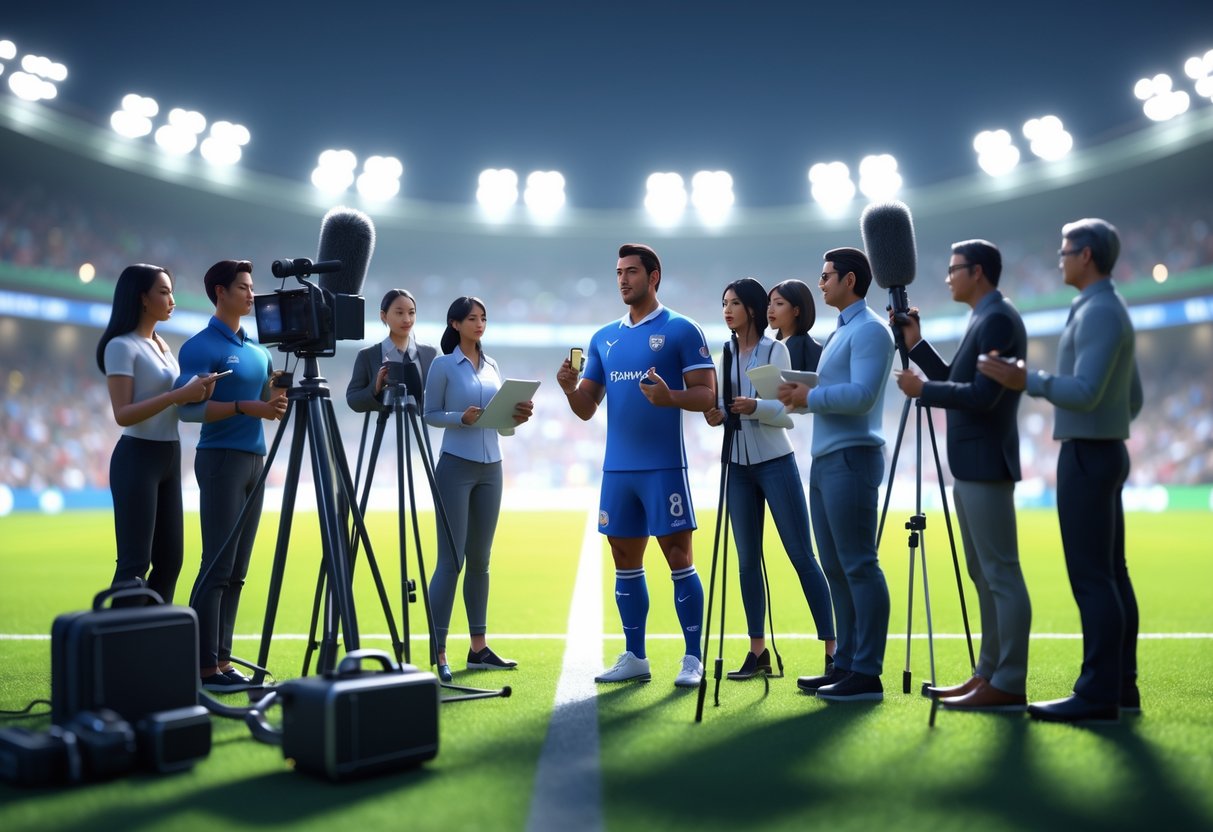
Post-match interviews reach millions through TV and digital platforms. Social media blasts these moments across the globe in seconds.
Television and Live Streams
Broadcasters like Sky Sports and BBC grab post-match interviews within minutes of the final whistle. These interviews air live, catching peak audiences when emotions are raw.
Live streaming platforms have changed the game:
• DAZN gives exclusive sideline chats and behind-the-scenes looks
• YouTube has instant highlights and full replays
• Twitch streams live reactions from gaming personalities
Broadcast teams juggle multiple camera angles during interviews. They catch player expressions, crowd shots, and manager reactions all at once.
Technical requirements include:
- Wireless mics for clear sound
- Camera operators set up in key spots
- Live editing for instant replays
- Satellite uplinks for worldwide reach
Post-match coverage takes just as much coordination as the match itself. Producers prep highlight reels, line up interviews, and break down the game with experts.
Role of Social Media
Social media turns post-match interviews into viral moments almost instantly. Platforms blast out key quotes, reactions, and controversy to huge audiences.
Twitter leads the charge:
- Journalists tweet out quotes as interviews happen
- Video clips spread through retweets
- Hashtags trend on memorable responses
- Fan reactions create new storylines
Instagram and TikTok focus on visuals. Short clips of emotional moments or wild celebrations hit younger viewers who might skip TV.
Social media creates immediate feedback loops. Players see fan reactions while still in the locker room. Controversial comments spark debates in hours.
Club social media teams watch these conversations closely. They push positive moments and try to manage any drama. Many clubs now make their own post-match content just for social.
With this instant reach, every post-match interview matters more than ever.
Navigating the Search for Opportunities
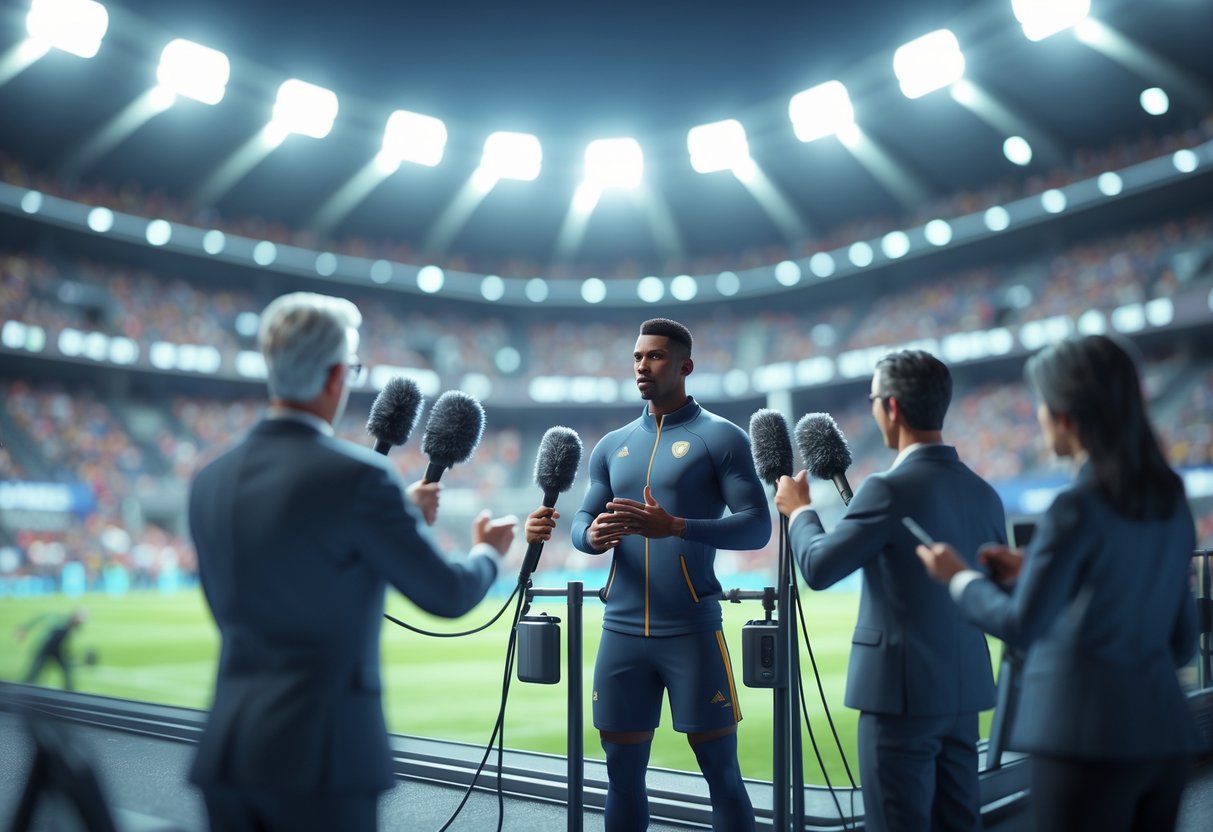
Once your post-match interview wraps up, the real grind starts—applying for teams and turning feedback into progress. Smart applicants keep track of their applications and treat every interview as a learning experience.
Applying After the Match
Start your search within a day of your post-match interview. Team recruiters often move fast, especially when your gameplay is fresh in their minds.
Set up an application tracking system—even a simple spreadsheet works. Track team names, dates, interview status, and follow-ups. This keeps you from mixing up teams during callbacks.
Make custom applications for each team. Generic ones get ignored. Look up each org’s roster changes, results, and culture. Mention moments from your interview that fit what they’re looking for.
Follow up smartly within a week if you haven’t heard back. Send a short thank you and highlight one reason you’re a fit. Don’t spam them every day.
| Application Timeline | Action Required |
|---|---|
| Day 1-2 | Submit tailored application |
| Day 7 | First follow-up message |
| Day 14 | Final follow-up (if needed) |
Teams often fill spots through player referrals. Keep up with players you’ve interviewed with. They might tip you off about openings or put in a good word.
Using Interview Feedback for Growth
Turn every bit of interview feedback into a way to get better. Even a rejection can teach you something valuable.
Write down feedback right after each interview while it’s still fresh. Note the positives and what you need to improve. Sort your notes into gameplay, communication, and team fit.
Work on common concerns that pop up across interviews. If several coaches mention your positioning, make it a priority in your training routine. Track which issues come up often.
Set clear, measurable goals based on feedback. Instead of “improve communication,” try “call out enemy positions within two seconds.” It’s way easier to track your progress.
Ask for clarification if feedback is vague. Email interviewers about comments like “needs more game sense.” Most coaches respect players who want to improve.
Share your progress with teams that passed on you. Every few months, send a quick update showing specific improvements. A lot of orgs keep tabs on players for future openings.
Heads up: Don’t argue about feedback during or after interviews. Even if you disagree, thank them and think about their perspective later.
Post-Match Interview Challenges
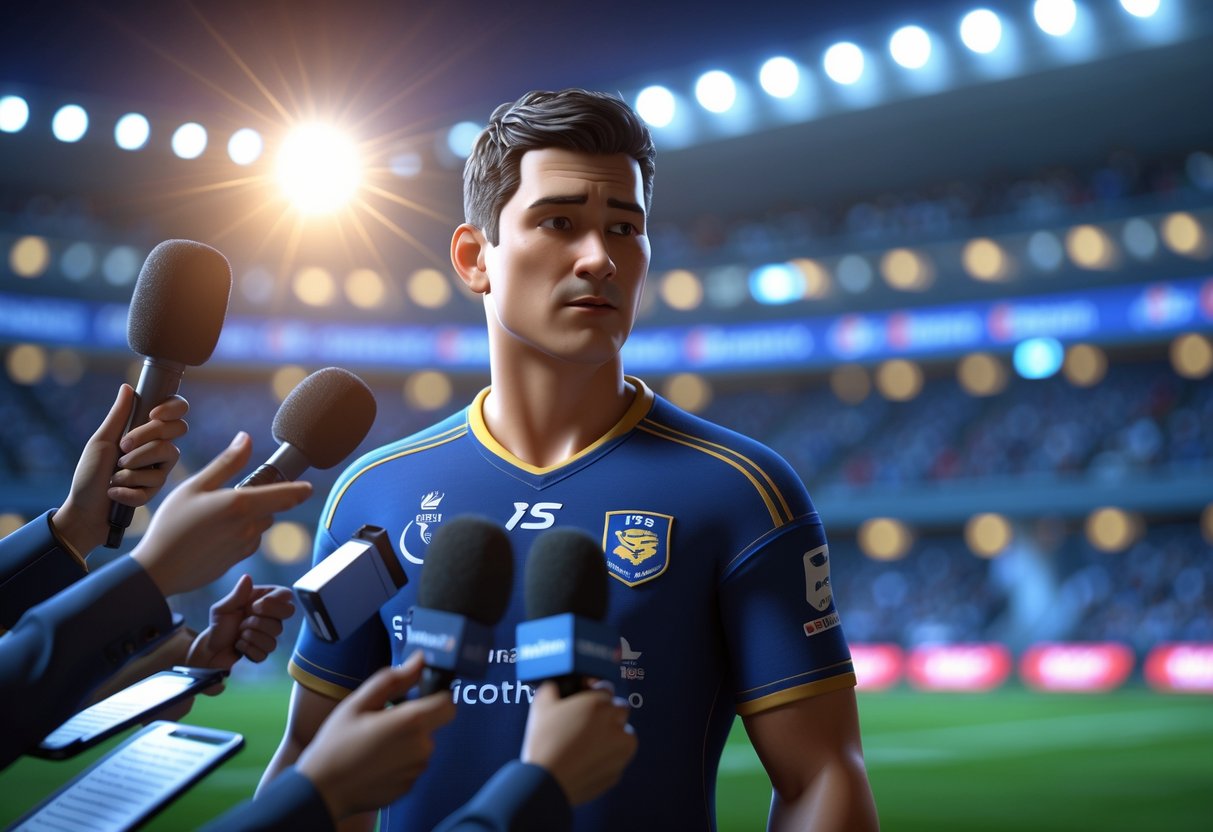
Post-match interviews throw players into the spotlight with tough questions and emotions running wild. A lot of esports athletes find the standard questions tough—they can end up sounding stiff or rehearsed.
Handling Difficult Questions
The hardest moments come when journalists ask about bad performances, team conflicts, or controversial plays. Players often get these questions right after heartbreaking losses, when adrenaline’s still high.
Common difficult questions include:
- “What went wrong in that final round?”
- “How do you respond to critics questioning your strategy?”
- “Can you explain the apparent miscommunication with your teammate?”
Successful players practice bridging techniques. They acknowledge the question, then shift to their main point. For example: “That round was tough, but we’re focused on preparing for the next match.”
Heads up: Defensive answers can make things worse with journalists.
Staying calm is key—millions might be watching. Many pro orgs now train players to handle pressure without creating viral moments for the wrong reasons.
Dealing with Clichés and Stereotypes
Post-match interviews often slip into boring patterns, making players sound robotic. Stuff like “we gave 110%” or “we’ll take it one game at a time” doesn’t tell viewers anything real.
Overused phrases that add nothing:
- “At the end of the day”
- “We executed our game plan”
- “Credit to the other team”
The real challenge is sounding authentic without stirring up drama. Players need to be honest but still professional, especially about teammates or opponents.
Smart players prep genuine talking points ahead of time. They’ll mention specific tactical moves, shout out teammates, or admit where they can improve—without going overboard.
Quick tip: Before each interview, jot down three specific things about your performance. It helps you avoid falling back on clichés.
This kind of prep makes interviews more interesting and protects both your rep and your team’s.
Strategies for a Successful Post-Match Interview
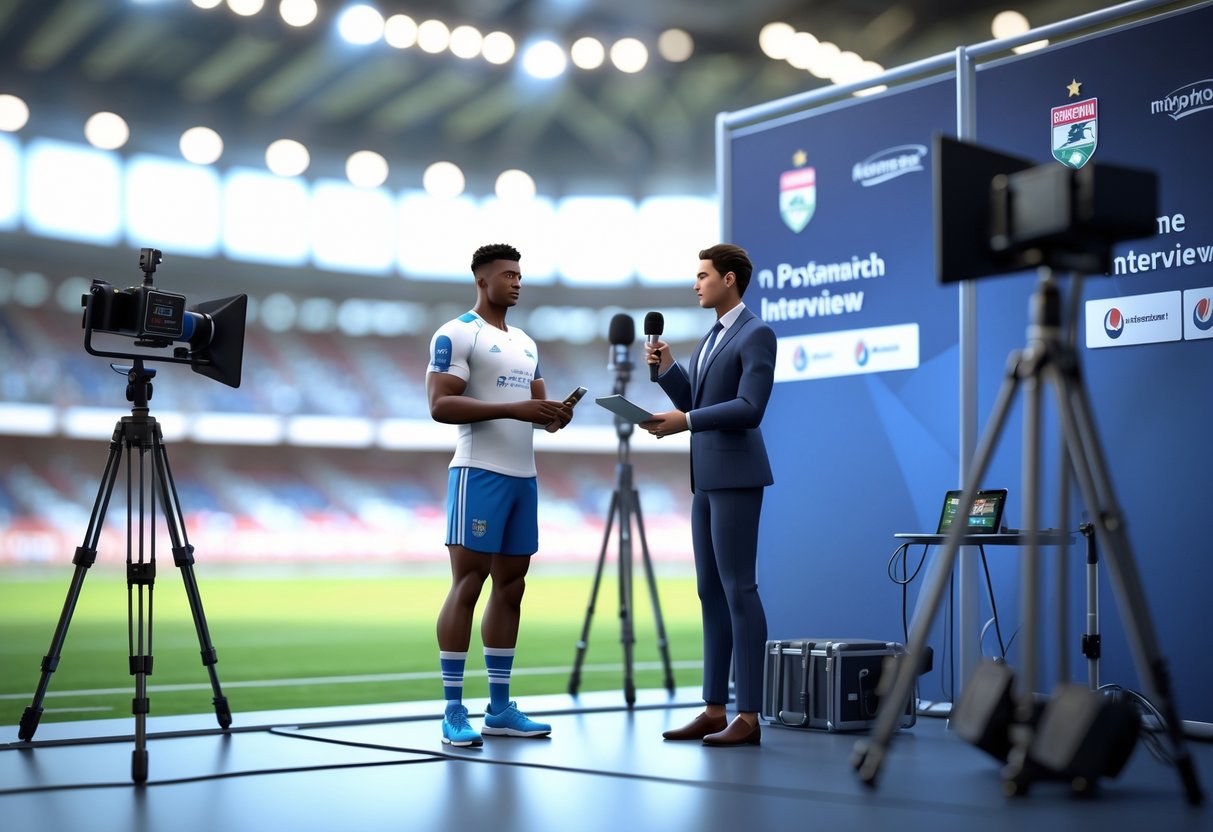
Post-match interviews demand clear communication even when you’re under pressure. Staying calm but real helps you build lasting relationships with media and fans.
Composure and Authenticity
Take a deep breath after your match. Those few seconds let you gather your thoughts and avoid blurting out something you’ll regret.
Keep eye contact with the interviewer. Looking away makes you seem checked out, and viewers notice. That’s not great for your image.
Use your hands naturally. We all gesture when we talk, so forcing yourself to stay still just makes you look awkward.
Bridge tough questions to topics you want to highlight. If you get a tricky one, acknowledge it, then pivot: “That’s one way to see it, but I was really impressed with how our team pulled together in that last push.”
Don’t treat interviews as a strict Q&A. You control your message—within reason. Have a few interesting points ready, even if nobody asks about them directly.
Building a Positive Reputation
Follow up professionally. Thank the interviewer and offer extra context if needed. It’s a small gesture, but it pays off.
Show real interest in the conversation. Reporters remember players who engage, not just those who rush through. They’ll cover you better next time.
Practice bridging statements during scrims or with your coach. Run through tough questions about losses or conflicts until those answers feel natural.
Build relationships before you need them. Chat with regular reporters when things are calm. When trouble hits, they’ll already know you’re open and honest.
Every interview shapes how fans and sponsors see you. Consistent professionalism and authenticity set you up for long-term success, not just a good headline.
Cultural and Regional Variations
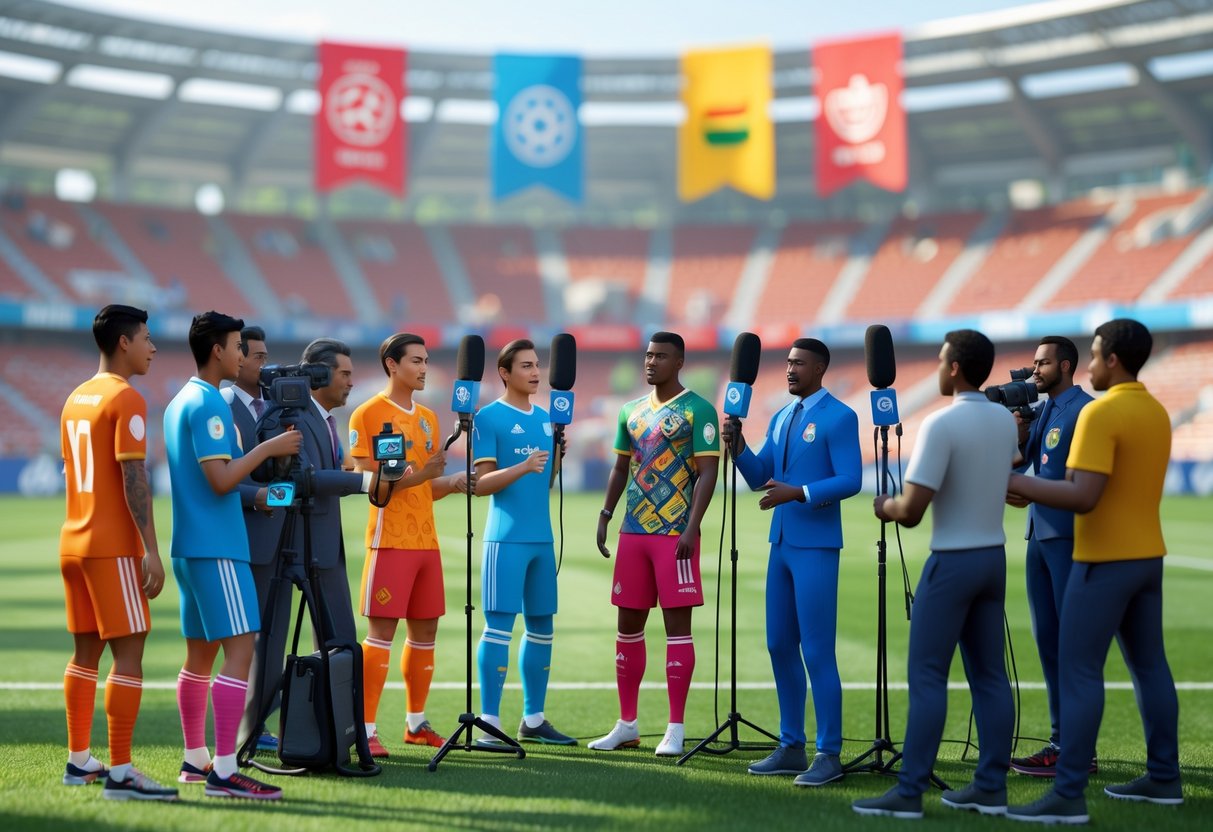
Post-match interview styles can change a lot depending on the sport or country. What’s respectful in one place might seem cold in another. And the way footballers talk after a match? It might not work at all in cricket.
Approaches in Different Sports
Rugby interviews usually take a gentler approach than most other sports. Interviewers often use terms of endearment and show sympathy after losses.
They’ll highlight positive moments, even when a team hasn’t played its best.
Football post-match interviews feel more structured. Reporters ask direct questions about tactics or player performance.
The tone stays professional, but it sometimes gets confrontational, especially after controversial matches.
Cricket interviews come across as formal and respectful. Players rarely get hit with aggressive questions right after a match.
Interviewers give players time to answer and try not to interrupt them.
American sports like basketball and American football bring a totally different energy. Reporters ask pointed questions about mistakes.
Players know they’ll face direct challenges about their own performance and the team’s strategy.
| Sport | Interview Tone | Question Style | Typical Length |
|---|---|---|---|
| Rugby | Supportive | Open-ended | 3-5 minutes |
| Football | Professional | Direct | 2-4 minutes |
| Cricket | Respectful | Formal | 4-6 minutes |
| Basketball | Confrontational | Pointed | 1-3 minutes |
International Interview Styles
German and English football interviews really show off cultural differences. German interviewers usually ask longer, detailed questions about tactics.
English journalists, on the other hand, stick to shorter, more emotional questions about how players feel.
New Zealand rugby interviews create what researchers call a “conciliatory” experience. Interviewers use humor and praise to ease tension.
Australian sports media doesn’t do this—they take a more challenging approach.
Asian sports culture puts a lot of emphasis on respect for authority. Interviewers almost never interrupt coaches or senior players.
Questions focus on the team as a whole, not just individuals.
Cross-cultural interviews need careful adaptation. What feels like friendly banter in the UK might seem unprofessional elsewhere.
Silence and pauses can mean totally different things, depending on the country.
Ethics and Professionalism
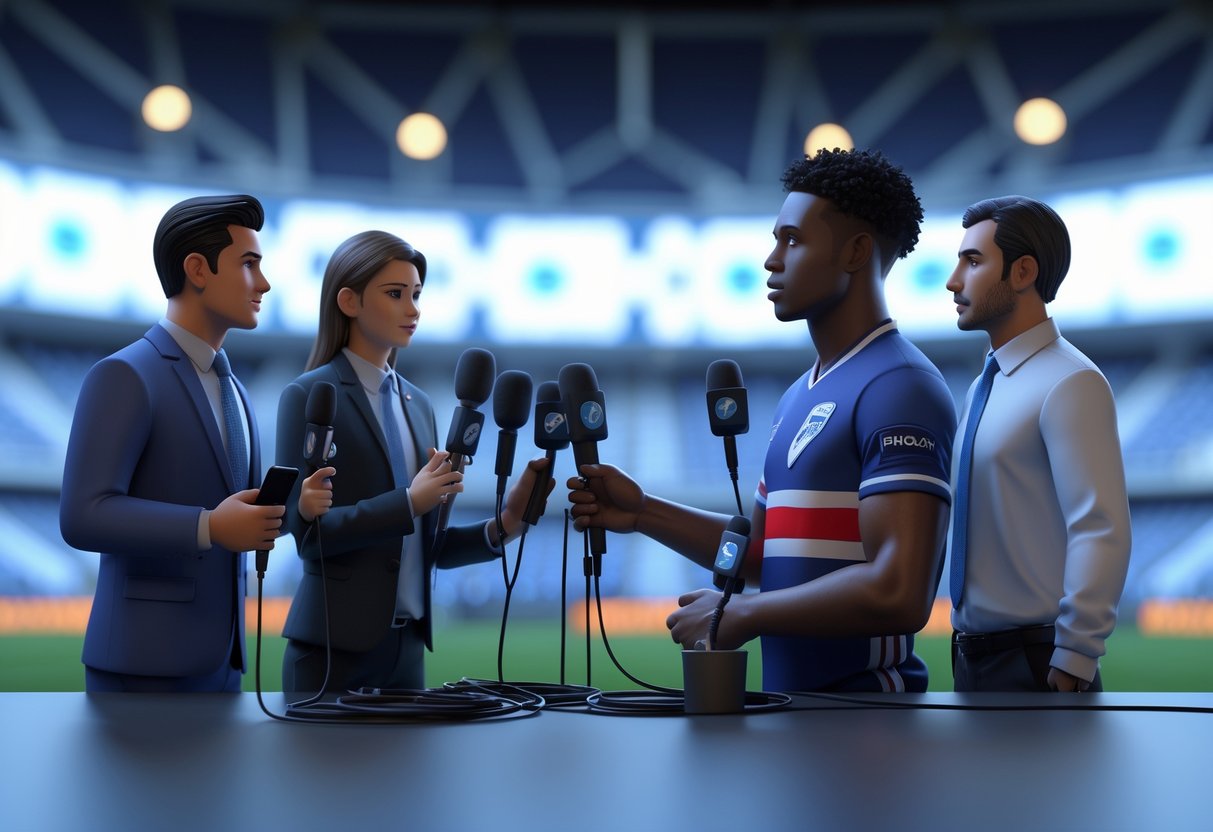
Post-match interviews demand attention to ethics and professionalism. Players, journalists, and media teams need to balance transparency with privacy, especially during emotional moments.
Respectful Interactions
Timing matters most when setting up post-match interviews. It’s best to give players a few minutes to decompress after tough matches.
Emotions run high in competitive esports. Some players get frustrated after losses, others feel overwhelmed after big wins.
Professional interviewers avoid:
- Aggressive questions right after a defeat
- Personal attacks or inflammatory remarks
- Questions meant to stir up drama between teammates
Best practices include:
- Neutral tone: Keep questions factual, not accusatory
- Active listening: Let players finish their answers
- Cultural sensitivity: Respect different communication styles, especially with international teams
A lot of esports personalities are young adults, still learning media skills. We can help them by staying patient and professional.
Quick win: Frame questions in a positive way when possible. Something like “What did you learn from today’s match?” lands better than “Why did you lose so badly?”
Privacy Concerns
Personal boundaries matter a lot during post-match coverage. Not every part of a player’s life belongs in the spotlight.
We should separate relevant match commentary from private matters. Team conflicts, personal relationships, or family stuff usually don’t belong in post-match interviews.
Protected information includes:
- Medical conditions or mental health struggles
- Financial info about contracts or earnings
- Personal relationships outside the game
- Private team communications or strategies
Media guidelines suggest:
- Clear consent: Always check if players are okay with being interviewed
- Defined scope: Stick to match-related topics unless they invite you elsewhere
- Editing responsibility: Cut out inappropriate content before publishing
Young players especially need protection from invasive questions. Their careers shouldn’t get derailed by bad media experiences.
Warning: Recording someone without permission breaks most tournament media policies and can get your credentials taken away.
Social media complicates things even more. Comments made during streams or casual posts might seem fair game, but professional coverage should hold itself to a higher standard.
Frequently Asked Questions
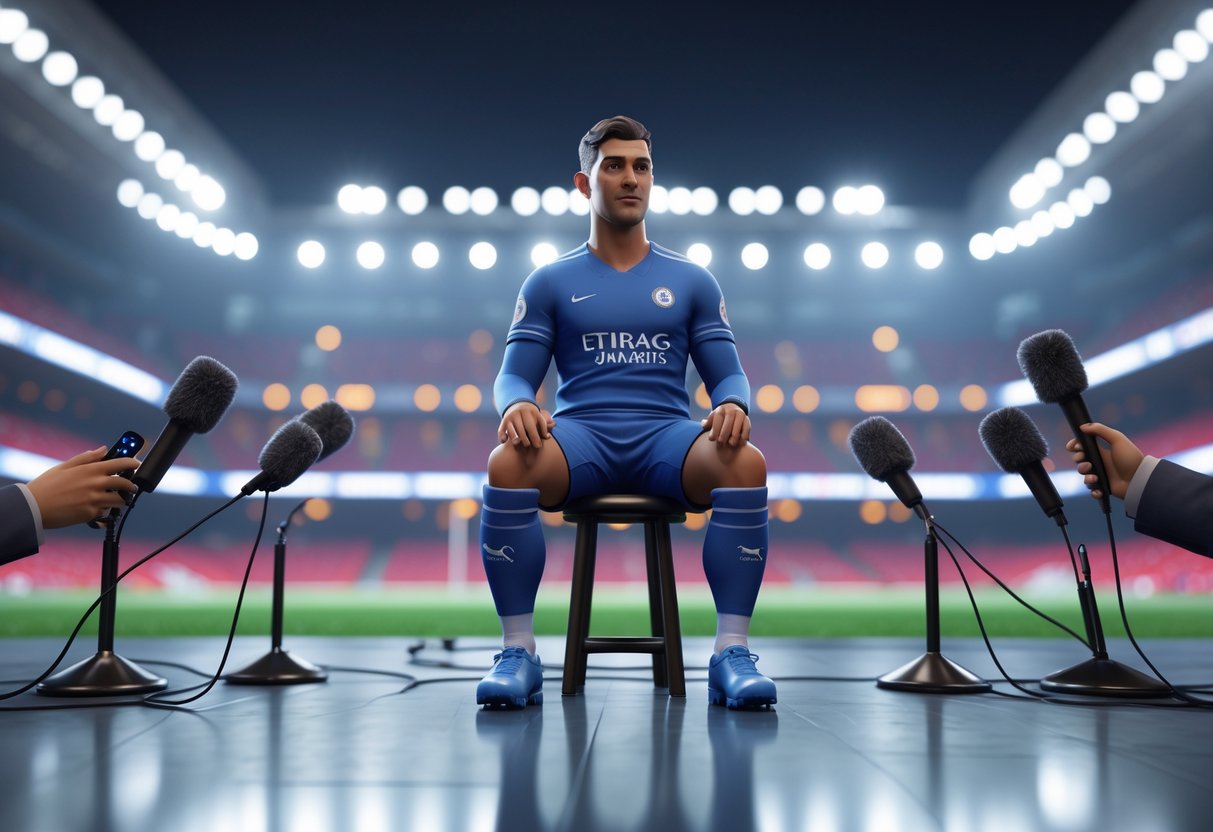
People have plenty of questions about post-match interviews—their purpose, how players get ready, and what impact these conversations have. Players and viewers both wonder about the typical questions, how athletes prepare, and what these interviews mean for a career.
What are the typical questions asked during a post-match interview in football?
Football post-match interviews usually follow a familiar path. Reporters ask about how the player felt during the match, what led to the win or loss, and what the team plans to focus on next.
The go-to opener is often, “How did you feel out there today?” That gives players space to talk about their emotions and experience.
Interviewers then dig into tactics or preparation, asking about key moments and adjustments.
Other standard questions cover team performance, individual contributions, and what comes next. Players often get asked to break down moments that changed the game’s outcome.
How do players prepare for post-match interviews in tennis?
Tennis players often start preparing before the match even ends. They think about what went well, what didn’t, and how they want to come across.
A lot of players work with media training specialists. These pros teach them how to stay on message and avoid saying anything controversial.
Players keep mental notes during matches about moments they might want to mention. This way, they can share specific examples instead of just giving generic answers.
Can you explain the difference between a pre-match and post-match interviews in sport?
Pre-match interviews focus on preparation, expectations, and game plans. Athletes talk about their training, mindset, and what they hope to accomplish.
Post-match interviews shift to analysis and reflection. Players review what actually happened, explain key moments, and compare their performance to their original goals.
The emotional tone really changes between the two. Pre-match interviews sound more controlled and forward-looking, while post-match chats capture those immediate, honest reactions and assessments.
What’s the purpose of conducting a post-match interview with athletes?
Post-match interviews serve a few different purposes. Fans get a peek into players’ thoughts and emotions, which helps them feel a deeper connection with their favorite athletes.
Media outlets use these interviews to add context and analysis to their coverage. Quotes and insights help journalists tell a more complete story about the match.
Teams and sponsors also benefit. Interviews offer valuable exposure and help build brands. Athletes can reinforce team messages and show professionalism to sponsors.
How do interviewers ensure they ask relevant questions in post-match interviews?
Professional interviewers get ready by watching the match closely and taking notes about key moments. They look for turning points, standout performances, and controversial decisions that viewers care about.
Most journalists keep a few standard questions handy to kick things off. These help athletes ease into the conversation before moving to more specific topics.
The best interviewers pay attention to the athlete’s answers and ask follow-up questions. That keeps the conversation natural and often leads to more interesting insights than just sticking to a script.
What impact can a post-match interview have on a player’s public image?
When players handle interviews well, they can really boost their reputation. Fans and media tend to respect athletes who give honest, thoughtful answers—even if the game didn’t go their way.
But if a player fumbles an interview, it can hurt their relationship with supporters and the press. If they come off as dismissive, make excuses, or just show poor sportsmanship, people notice. The criticism can stick around long after the final whistle.
Social media only makes things louder. One quote or even a gesture can blow up online. That kind of attention can affect sponsorships, fan support, and even a player’s career for years.

